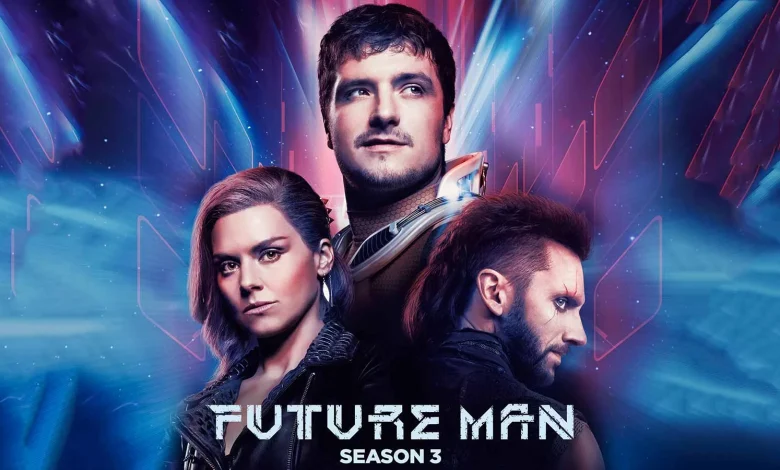Future Man: Why 2025’s Sci-Fi Underdog Is Finally Getting Its Moment on Netflix

Quick Read
- Future Man, originally a Hulu series (2017–2020), is now streaming all seasons on Netflix.
- The show stars Josh Hutcherson and blends raunchy comedy with sci-fi time travel.
- Critics and fans call it a ‘hidden gem,’ boasting a 91% Rotten Tomatoes rating.
- Netflix’s acquisition signals a new chance for cult favorites to reach wider audiences.
- The series is praised for its character development and genre-savvy storytelling.
The Sci-Fi Comedy That Refused to Die
For years, Future Man was one of those series you might hear about from a friend who delights in discovering cult TV. It ran from 2017 to 2020, racking up more than 30 episodes, but if you missed it, you weren’t alone. Developed by Hulu, the show seemed destined for niche status—an irreverent, genre-bending blend of raunchy humor and time-travel adventure that rarely makes it to mainstream prominence. Yet, as of November 2025, every episode is now streaming on Netflix, giving the series a long-overdue second wind and a chance to reach a much broader audience. (Mirror)
So, why is Future Man suddenly in the spotlight? The answer is layered, like the show itself. First, the basics: Josh Hutcherson stars as Josh Futturman, a janitor whose life changes dramatically after he beats a supposedly ‘impossible’ video game. When game characters Tiger and Wolf (Eliza Coupe and Derek Wilson) show up at his door, he’s drafted into a mission to save humanity—jumping through time, fighting off alien threats, and generally trying to avoid total disaster. The premise sounds familiar, but the execution is anything but standard. Seth Rogen, serving as executive producer, even appears as a gleefully bizarre game show host in later episodes. The result? A series hailed by some fans as “one of the best sci-fi series ever.”
A Cult Classic Finds Its Audience
The move to Netflix isn’t just a change in platform; it’s a shot at redemption. Hulu, now owned by Disney, removed Future Man from its streaming library as part of budget cuts and strategic shifts. In the crowded world of streaming, it’s easy for even critically acclaimed series to slip through the cracks—especially those that don’t fit into neat categories. But with Netflix’s global reach, Future Man is seeing an influx of new viewers and, perhaps, the kind of buzz that eluded it during its original run. Reviews on Rotten Tomatoes hover at an impressive 91%, and social media is suddenly alight with rediscovered praise. One fan writes, “It’s one of those hidden gems you’ll be proud to have found. I’ve watched it three times, and it’s one of those shows I’ll probably rewatch again.”
Critics, too, have warmed to the series’ unconventional approach. The Guardian called it a “bonkers time-travel series full of smut, toilet humour and sci-fi fun.” It’s a show that wears its influences on its sleeve—everything from Back to the Future to The Terminator and, notably, The Running Man (which itself was remade in 2025 with Glen Powell in the lead, further fueling the appetite for dystopian sci-fi). But Future Man doesn’t just reference its predecessors; it gleefully subverts them, poking fun at genre conventions while still offering heartfelt character development and surprisingly sharp commentary on the tropes of heroism, fate, and the consequences of meddling with time.
Comedy, Chaos, and Character: The Series’ Lasting Appeal
What sets Future Man apart from other sci-fi comedies is its willingness to take risks. The series is unapologetically crude—raunchy jokes, meta-references, and outlandish scenarios abound. But beneath the chaos, there’s a surprisingly coherent emotional core. Hutcherson’s Josh is more than just a bumbling protagonist; he’s an everyman thrust into absurdity, forced to grow alongside his mismatched allies. Critics have praised the show’s character arcs, especially in the second season, which one fan called “a masterpiece.” Each member of the team brings their own baggage, and the show never shies away from exploring the impact of trauma, regret, and hope in a world that’s perpetually falling apart.
Eliza Coupe and Derek Wilson shine as Tiger and Wolf, their dynamic shifting from antagonistic to genuinely caring as they learn to navigate not just time travel but the complexities of human relationships. The show’s humor, often bordering on the surreal, is balanced by moments of genuine pathos—episodes where the fate of humanity hangs in the balance, and the characters’ choices have real consequences.
Streaming’s New Frontier: Hidden Gems and Second Chances
Future Man’s journey from overlooked Hulu property to Netflix headliner is emblematic of the evolving landscape of streaming entertainment. As platforms compete for subscribers, the value of ‘hidden gems’—shows that didn’t get their due the first time around—has become increasingly clear. Netflix’s acquisition of Future Man not only exposes the series to millions of potential fans but also signals a broader shift: the recognition that genre-bending, risk-taking storytelling deserves a place at the table.
For creators, the lesson is equally clear. The streaming world is unpredictable, and what fails to make waves on one platform can, with the right timing and exposure, become a sensation elsewhere. For viewers, it’s a reminder to keep digging—sometimes the most rewarding stories are the ones you stumble across by accident, long after their initial run.
And for the sci-fi genre, which has often been pigeonholed into either high-brow allegory or popcorn spectacle, Future Man proves there’s room for both. It’s a show that can make you laugh out loud one minute and reflect on the nature of destiny the next—a rare feat, and one worth celebrating as the series finds new life in 2025.
Assessment:
Future Man’s resurgence is a testament to the power of streaming platforms to resurrect overlooked works and connect them with new audiences. Its blend of comedy, genre savvy, and emotional depth sets a high bar for sci-fi storytelling, reminding us that originality and risk-taking are still valued in an industry often driven by formulas. As the streaming wars intensify, it’s these unexpected second acts that may shape the future of television more than any blockbuster release. (Mirror, The Guardian)




